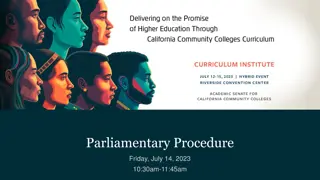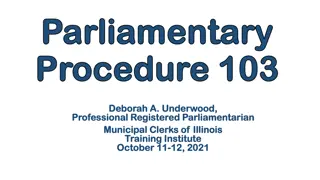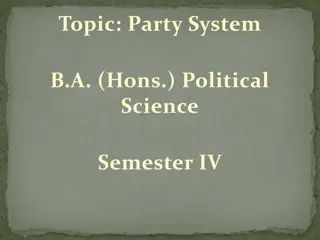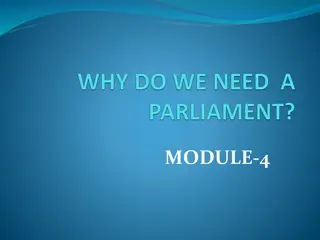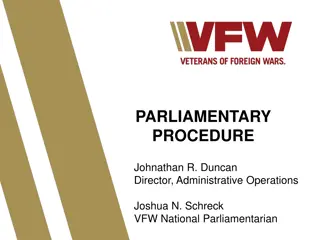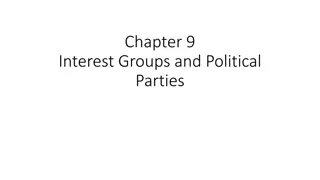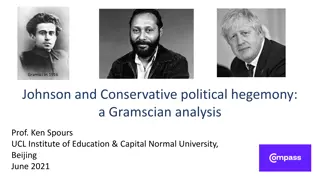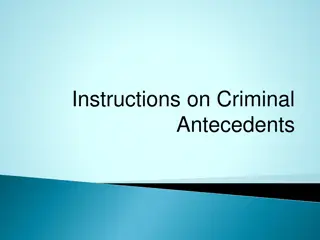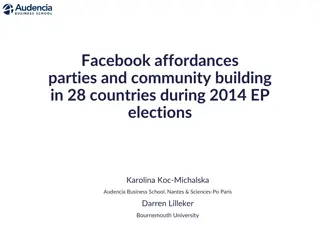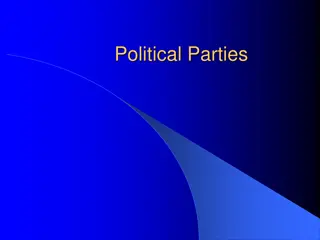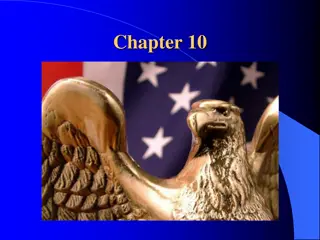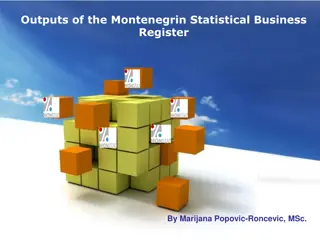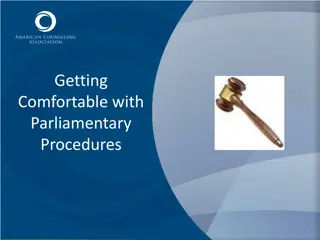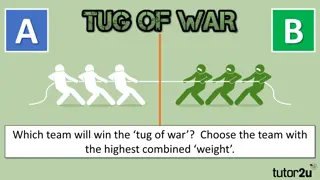Europeanization of Montenegrin Political Parties During 2016 Parliamentary Elections
The study focuses on analyzing the Europeanization process of political parties in Montenegro during the 2016 parliamentary elections, specifically examining the depth of content in election manifestos. It aims to investigate the influence of the EU on these parties and evaluate the level of interest in Europeanization among Montenegrin political parties. The research uses a top-down approach to explore the impact of European integration on political parties in Montenegro as key agents of change.
Download Presentation

Please find below an Image/Link to download the presentation.
The content on the website is provided AS IS for your information and personal use only. It may not be sold, licensed, or shared on other websites without obtaining consent from the author.If you encounter any issues during the download, it is possible that the publisher has removed the file from their server.
You are allowed to download the files provided on this website for personal or commercial use, subject to the condition that they are used lawfully. All files are the property of their respective owners.
The content on the website is provided AS IS for your information and personal use only. It may not be sold, licensed, or shared on other websites without obtaining consent from the author.
E N D
Presentation Transcript
Introduction Study aims to examine the process of Europeanization of political parties in Montenegro during parliamentary elections 2016. emphasizing the analysis of depth of content of election manifestos Focus of research is to determine the reach and outcome of influence of EU on parties Analysis with top down approach of European integration on parties in Montenegro, as main agents of comprehensive changes Key question: whether the interest for the concept of Europeanization increased or decreased among Montenegrin political parties during the elections? Why political parties? 1. Crucial stakeholders in the political life which affects the creation of state and individual public policies; 2. Influence of party s views, believes and opinions on citizens; 3. Important channel of informing the citizens on EU s policies, advantages and deficiencies introduced by the process of accession. Hence, it is important to determine the level of transformative power of EU among domestic political parties, because in the upcoming period their influence will intensify the pace and quality of process of accession of Montenegro to Union, as well as the increase or decrease in the support of citizens for that process.
Montenegro in the European integration process Montenegro as a positive example of process of European integration in the region That progress depends on the capacity of domestic actors to produce structural changes, but at the same time, it is a governed project whereby the EU positioned itself as factor of internal changes Montenegro severely suffers due to the issue of contested statehood i.e. weak state capacities due to the lack of resources (personnel, professional staff and funds) and institutionally enrooted corruption and clientelism Through the use of model of foreign initiative, EU influenced the process of democratization and consolidation in Montenegro, by strengthening the institutional capacities with the aim of harmonization with norms and rules of EU. Transformative power of EU is visible, at least, in two cases: 1. Visa liberalisation 2. Recommendations provided through the EU Opinion on the preparedness of Montenegro for membership in EU
Operationalisation of research Parliamentary year 2016 was chosen because it represents the period in which Montenegro progressed in accession negotiations with the EU, with 24, out of 35 in total, opened negotiating chapters Empirical analysis was conducted based on three primary sources election manifestos Relevant parties represent those political structures which have at least 2 MPs in the current composition of Parliament of Montenegro (CMP/MARPOR 5TH reversed edition 2014: 2) Study does not include the analysis of election manifests of certain civic and ethnic-minority parties: FORCA, AK, CCI and LP, or of those who were not represented in the Parliament so far.
Operationalisation of research List of analysed political parties and coalitions in Montenegro
Operationalisation of research SAA was used as the basis of defining the methodological framework of research Progress of Western Balkan states, even of Montenegro, in European integration depends entirely on meeting the conditions that were placed on three different levels, and defined through different documents of EU: 1. Copenhagen criteria or general conditions (stability of democratic institutions, rule of law, respect and protection of human and minority rights and functional market economy); 2. Conditions common for WB states (cooperation with Hague Tribunal, regional cooperation and strengthening of good neighbourly relations, return of refugees, ethnic and religious reconciliation, protection of minorities, freedom of media, reform of judiciary); 3. Specific conditions which relate to Montenegro (decisive fight against corruption and organized crime, reform of state institutions, judicial reform, fair and free elections, protection and improvement of status of human and minority rights) Established scheme of categories will relate to 11 defined categories, related to meeting the political and economic conditions for membership in EU
Results of research Analysis of programme content of political parties and coalitions for 2016 parliamentary elections 2016 Relative prominence of European integration in election programmes Yes Positive or favourable references on particular EU policy No Negative or no references on particular EU policy
Democratic Party of Socialists (DPS) Party strongly supports the membership of Montenegro in EU, DPS reflects the promotion of European policies and values only principally: Primary goal by the end of the term of next Government will be to round up the process of negotiations on membership in EU and make the preparations for the signing of the Agreement on the accession to European Union (DPS 2016: 24) DPS election manifesto is characterised with the use and promotion of issue of restoration of independence and thousand years of statehood , even though the issue of state and legal status of Montenegro was solved only 10 years ago Programme reflects a certain degree of visibility of party s Europeanization - promotion of EU s policies trough party s declarative support to membership of Montenegro to EU, It contains a special chapter dedicated to European integration Steady pace to European family ), without detailed explanations as to how certain European policies will be implemented in Montenegro Great amount of attention is dedicated to achievements of Government of Montenegro during the process of European integration: out of 33 chapters of legal acqui, 24 were opened, whereby 2 were provisionally closed. We adopted and submitted 29 negotiating positions, and met the initial benchmarks in 11 out of 13 chapters (DPS 2016: 24) Latest election programme of DPS is more substantial, systematic and serious content-wise, especially in the area of European integration compared to previous DPS election manifesto can be summed up as general, short and insufficiently elaborated, without the effort to indicate which specific measures or manners of action will be taken to meet the political conditions for membership in EU.
Democratic Front (DF) Coalitional election manifesto reflects the evident dose of euro-scepticism in terms of the membership and future of EU Election manifesto shows the influence of transformative power of EU on domestic political actors through quality promotion of EU s policies. Hence, the principle of Europeanization on DF election manifesto de facto exists The level of euro-skepticism is visible in the provision of insignificant number of measures in the area of European integration (7 out of the total of 707 proposed), especially when considering that the 2012 election manifesto in which DF proposed more than 13 (out of the total of 595 proposed) significant and unusual measures for the acceleration of accession negotiations of Montenegro with the EU Proposed measures of DF s manifesto 2016 are mostly identical to those from previous election cycles for this area Part related to area of foreign policy presents a major turning point for DF in terms of foreign policy orientation towards Russia. It states that government of DF will abolish the sanctions to Russia, run a balanced foreign policy, and maintain good relations with both EU and Russia, which is a long-running reliable partner of Montenegro, and rectify many historical foreign-political errors and omissions, caused in last two decades, which directly contradict national interests of Montenegro (DF 2016: 70) The 2016 s election manifesto Da Crna Gora radi (Make Montenegro work), compared to programme Programom 595 mjera (Programme of 595 measures) from 2012, brings no significant changes in terms of context or concept, in other words, the majority of measures from the domain of EU have been reiterated Even though the manifesto reflects a visible Euro-sceptic tendency concerning the process of European integration, it is important to mention that the transformative power of EU is evident in the election programme of DF, through the proposed measures with the aim of harmonisation with the political conditions of EU
Grand Coalition KEY Fully supports the process of European integration and future membership of Montenegro in EU Content-wise, coalitional election manifest is characterised with high level of representation of values and policies in the EU, mostly partially offering the solutions and measures for the purpose of harmonisation with the conditional political criteria of EU Election programme of Grand Coalition KEY, on one hand, suggests credible plans of action in order to address certain EU political conditions (rule of law, fight against corruption and organised crime, reform of judiciary) thus demonstrating great level of influence of EU on domestic political agents: adopts laws on president, Parliament and Government of Montenegro, review laws on Judicial Council and judges and state prosecution (rule of law); In some of the segments, the manifest differs with general or declarative absorption of EU s values and policies (human and minority rights, regional cooperation, free elections, freedom of media, reform of state administration), but it does not provide clear and specific measures and plans of action regarding the resolution of issues or implementation of certain policy of EU : we will pay special attention to regional cooperation and good neighbourly relations, through the resolution of current issues and promotion of regional projects of development (regional cooperation); we get the impression that Grand Coalition KEY supports future membership of Montenegro in EU only in declarative sense, which is demonstrated by the content of election programme where the area of European integration is briefly comprised in chapter foreign policies Grand Coalition KEY did achieve a visible, yet insufficiently profound level of Europeanization, as the result of EU s influence on domestic political actors through the presence of EU s values in manifest, but with partial recommendation of specific issues and measures of harmonisation with conditional political requirements of EU.
Democratic Montenegro (DMNE) As far as the Democrats are concerned, full membership of Montenegro in EU presents one of the most important foreign policy priorities, and in that regard they strongly welcome the continuation of European processes of integration European issues are at the top of the party s list of priorities, or election programme, emphasising the importance of termination of process of consolidation of EU s values in the society. the manifest abounds with promotion of EU s values and policies, but it is equally evident that party only partially provides the measures and plans of action which could be used in the harmonisation with conditional political requirements of EU Democrats in their manifest dedicate special attention to individual political issues of EU (reform of judiciary and state administration, fight against corruption and organised crime, freedom of media and etc.) which ultimately results in the creation of specific, meaningful and credible solutions with the aim of harmonisation with the acquis communitaire : change in the manner of election of president and members of State commission for the protection of rights in public procurement proceeding the election should be performed by the Parliament, to which they should be accountable for their work, with the obligation of declaration and Government (reformof state administration); In other cases, the promotion of certain values of EU (human and minority rights, free elections) is only in present in declarative sense without clear and precise plans of action: Montenegro does not pay enough attention to minorities regarding their education, especially in the part of education of Roma population (DCG 2015: 70) This party was able to achieve a recognisable level of Europeanisation which is confirmed by significant emphasis of EU s policies in the election manifest, however, the reach of EU s influence on Democrats is limited.
Social Democratic Party of Montenegro (SDP) In the context of Europeanisation of domestic political parties, the election programme of SDP does not reflect particular interest for the harmonisation with the requirements of European Union Even though SDP claims that it strongly supports further continuation of process of European integration, the manifest is brief in content, insufficiently precise and inconsistent, demonstrating a limited influence of transformative power of EU on domestic political changes Apart from the relative promotion of certain policies of EU (rule of law, human rights, corruption and organised crime, reform of judiciary and state institutions, liberal market economy) in declarative and insufficiently elaborated manner, the electoral manifest does not provide appropriate solutions and measure with the aim of solving these political issues The content of manifest mainly relates to proclamation of general political principles: We will establish an uncompromised political will for the fight against corruption and organised crime, especially against that on high level (fight against corruption and organised crime) SDP election manifesto reflects an extremely low level of EU s influence on this party, thus the low level of Europeanization, primarily due to the insufficient level of representation of EU s policies in the analysed election manifesto
Positive Montenegro (PMNE) PMNE firmly supports further continuation of reforms of processes of integration, Election programme of PMNE contains a separate chapter European integration which emphasizes certain benefits which Montenegro will gain based on the full membership in EU. Membership in EU is the greatest guarantee of implementation of advanced legal solutions adopted based on the framework of EU, thereby of development of Montenegro in economic, political, cultural and social context, hence we are ought to invest all of our social potentials to that end (PCG 2016: 3) the programme did achieve a visible level of Europeanization through the promotion of almost every policy of EU (rule of law, human and minority rights, freedom of media, corruption and organised crime, reform of judiciary and state administration, liberal market economy). Little was done in the production of defined strategies and plans of action, which reduces this election manifest to vague proclamation of political, economic and social principles. What is of special importance for the continuation of accession negotiations is the fight against corruption and organised crime (corruption and organized crime) Progress compared to previous election programme PMNE election manifesto presents general party measures with the aim of meeting the political requirements for membership in EU which demonstrates that the transformative power of EU is of limited intensity in the case of PMNE.
Socijaldemocrats (SD) SD reflects an extremely low level of Europeanization by focusing only on the development of economic policy and improvement of living standards in Montenegro Election manifest shows an apparent lack of concern for European processes of integration. Programme of SD does not provide adequate solutions, measures or manners of acting in order to solve certain political issues which greatly hinder the progress of Montenegro on its path to membership in EU. Hence, party s stand in relation to values of EU is marginal, reducing mostly to declarative support to process of European integration and proclamation of default objectives. Hence the last chapter of their manifest Consistent for European Union and NATO states that the integration of Montenegro to European Union and NATO Alliance is of importance in the preservation of territorial integrity, political stability and creation of conditions for economic and social development in the community of European states and nations (SD 2016: 57) Manifest of SD unambiguously indicates on partial and relative promotion of EU s values and policies among the programme principles, thus indicating that the programme is highly limited, incomplete and unspecified content- wise, while simultaneously affiliated for declarative support to process of European integration as its fundamental programme postulate. Finally, apart from the obvious support to Euro-Atlantic political processes, the election manifest is characterised with the absence of EU s transformative power, hence it can be assumed that the process of Europeanisation in this political subject is fragmented and of low-intensity
Bosniak Party (BS) Bosniak party strongly advocates the policy of open doors in terms of the EU integration through chapter Integration Election programme reflects the promotion of EU s policies, but its content is limited, permeated with declarative support to requirements of EU. Election manifest of BS pays special attention to the majority of EU s policies (democracy, rule of law, human and minority rights, regional cooperation, freedom of media, corruption and organised crime, reform of judiciary and state institutions, liberal market economy), though in a general and unspecified manner, without the specific solutions, measures or strategies as to how to execute the harmonisation with European standards Regulated system creates the assumptions for an equal, fair and secure life where each individual will be able to create a family and provide it with proper conditions of life (rule of law); Compared to previous election programme from 2012, this manifest is evidently more quality, substantial and encompassing content-wise by emphasising almost every political issue imposed by the EU It is safe to assume that BS defined only the general principles in its manifest which correspond to EU s policies, but preserved the declarative level
Conclusions Results of research show that the influence of European Union on political parties in Montenegro is visible, but limited in terms of scope and range. new election programmes bring change in the perception of European policy, and EU as a whole, compared to previous elections, especially in the case of DF, thereby making a distinct turn towards Euro-scepticism There is a dominant support from relevant political actors for the continuation of European integration reforms, but it is not always accompanied with specific and detailed plans of action and strategies, which renders the support mostly as declarative. What is interesting based on the analysed, is that the highest level of Europeanisation is marked precisely by the political group (DF) which was marked as Euro-sceptic based on the same analysed programme content In case of other political subjects (DPS, KEY, SDP, DMNE, SD, PMNE, BS), which state that they strongly support the continuation of European integration processes, the influence of EU varies from party to party. In such a way, it ranges from those parties (KEY, DMNE), where the transformative power of EU resulted in the introduction of specific and appropriate measures that have been harmonised with the political conditions of EU, but this does not apply to every EU policy, only partially, all the way to those subjects (DPS, SDP, SD, PMNE, BS) who did not make an effort, or were not able to do so, to provide specific plans of action and strategies which involve the standards of EU, thus leaving the voters without a clear view on the majority of policies of EU
Conclusions Key challenge which impedes a more purposeful influence on the internal political processes and actors is the lack of political will, but all the more are capacities of political elites to adequately solve current reform political issues through the harmonisation with EU standards. Even though Montenegrin public strongly supports the process of accession to EU (63% of the population believes that EU membership would be beneficial for Montenegro), party political elites declaratively advocate the membership in EU as most important foreign policy priority, simultaneously systematically and adequately address political conditions laid in accession negotiations Hence the transformative power of EU on relevant political Montenegrin parties is visible in general framework but limited in specific range and outcome The level of implementation of EU s policies, rules and norms in Montenegro mostly depends on the interest of Montenegrin public for certain policy, which consequently succumbs to strong public pressure to harmonise with the political requirements of EU, more compulsory rather than actively. In other cases, the level of interest of political elite for meaningful and adequate harmonisation with standards of EU is marginal Our expect is that the influence of Europeanisation on internal changes will remain limited in the following period, unless the political elite decides to change its approach and demonstrate true political will, as well as the capacity, to fully harmonise with the conditions for the accession to EU. demonstrating limited effort to


